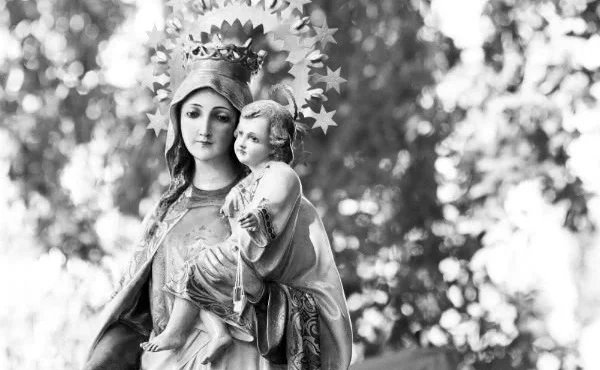Pope Pius XII was referring to this when he wrote in his Letter on the occasion of the 7th centenary of the Institution of the Scapular of Carmel (February 11, 1950), “For not with a light or passing matter are we here concerned, but with the obtaining of eternal life itself which is the substance of that Promise of the Most Blessed Virgin that has been handed down to us.”

In the same letter, he also made reference to the tradition that for those who are wearing the scapular when they die and are expiating their sins in Purgatory, our Lady will intercede to open the gates of Heaven to them as soon as possible, and at the latest on the Saturday following their death. This is known as the “Sabbatine privilege”. The Scapular of Our Lady of Mount Carmel is a Sacramental.
Prayer of Saint Simon Stock
O, Beautiful Flower of Carmel,
most fruitful vine,
Splendour of Heaven, holy and singular,
Who brought forth the Son of God,
still ever remaining a Pure Virgin,
assist me in this necessity.
O, Star of the Sea,
help and protect me.
Show me that Thou art my Mother.
O, Mary, conceived without sin: – Pray for us who have recourse to Thee.
Mother and Ornament of Carmel: – Pray for us.
Virgin, Flower of Carmel: – Pray for us.
Patroness of all who wear the Scapular: – Pray for us.
Hope of all who die wearing the Scapular: – Pray for us.
St. Joseph, Friend of the Sacred Heart: – Pray for us.
St. Joseph, Chaste Spouse of Mary: – Pray for us.
St. Joseph, our Patron: – Pray for us.
O, Sweet Heart of Mary: – Be our Salvation.
Saint Josemaria and the Scapular
Wear on your breast the holy scapular of Carmel. There are many excellent Marian devotions, but few are so deep-rooted among the faithful, or have received so many blessings from the Popes. Besides, how maternal the sabbatine privilege is!
The Way, 500
“Mother!” Call her again and again. She is listening, she sees you in danger perhaps, and with her Son’s grace she, your holy Mother Mary, offers you the refuge of her arms, the tenderness of her embrace. Call her, and you will find yourself with added strength for the new struggle.
The Way, 516
You are not alone. Suffer that tribulation joyfully. It’s true, poor child, that you don’t feel your Mother’s hand in yours. But... have you never seen the mothers of this earth, following their little ones with arms outstretched, when they venture to take their first shaky steps without anyone’s help? You are not alone: Mary is close beside you.
The Way, 900
May I give you some advice for you to put into practice daily? When your heart makes you feel those low cravings, say slowly to the Immaculate Virgin: “Look on me with compassion. Don’t abandon me, my Mother!” And recommend this prayer to others.
Furrow, 849
Our Mother is a model of correspondence with grace. If we contemplate her life, our Lord will give us the light we need to divinize our everyday existence. Throughout the year, when we celebrate feasts dedicated to Mary, and frequently on other days, we Christians can think of the Virgin. If we take advantage of these moments, trying to imagine how she would conduct herself in our circumstances, we will make steady progress. And in the end we will resemble her, as children come to look like their mother.
First, let us imitate her love. Charity cannot be content with just nice feelings; it must find its way into our conversations and, above all, into our deeds. The Virgin did not merely pronounce her fiat, “be it done to me according to your word”; in every moment she fulfilled that firm and irrevocable decision. So should we. When God’s love gets through to us and we come to know what he desires, we ought to commit ourselves to be faithful, loyal – and then be so in fact. Because “not everyone who says to me, ‘Lord, Lord!’ will enter the kingdom of heaven, but he who does the will of my Father in heaven.”
We must imitate her natural and supernatural refinement. She is a privileged creature in the history of salvation, for in Mary “the Word became flesh and dwelled among us.” But she is a reserved, quiet witness. She never wished to be praised, for she never sought her own glory. Mary is present at the mysteries surrounding the infancy of her Son, but these are “normal” mysteries, so to speak. When the great miracles take place and the crowds acclaim them in amazement, she is nowhere to be found. In Jerusalem when Christ, riding a little donkey, is proclaimed king, we don’t catch a glimpse of Mary. But after all have fled, she reappears next to the cross. This way of acting bespeaks personal greatness and depth, the sanctity of her soul.
Following her example of obedience to God, we can learn to serve delicately without being slavish. In Mary we don’t find the slightest trace of the attitude of the foolish virgins, who obey, but thoughtlessly. Our Lady listens attentively to what God wants, ponders what she doesn’t fully understand and asks about what she doesn’t know. Then she gives herself completely to doing the divine will: “Behold the handmaid of the Lord, be it done unto me according to your word.” Isn’t that marvellous? The blessed Virgin, our teacher in all we do, shows us here that obedience to God is not servile, does not bypass our conscience. We should be inwardly moved to discover the “freedom of the children of God.”
Christ is Passing By, 173
